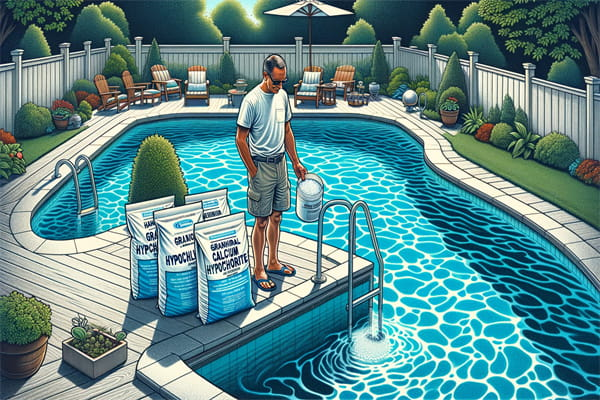Maintaining a clean and inviting swimming pool requires attention to sanitation and chemical balance. One of the key components in your pool maintenance arsenal should be calcium hypochlorite. This chemical is not only effective but also efficient in keeping your pool water safe and crystal clear. In this article, we’ll delve into the nitty-gritty of calcium hypochlorite: what it is and when to use it to ensure you’re getting the most out of your pool.

Ⅰ. Understanding Calcium Hypochlorite
Calcium hypochlorite is a powerful and efficient pool sanitizer that comes in a granular form. For pool owners who prioritize easy maintenance and effective results, it’s a standout choice because of its high chlorine content and long-lasting stability. Unlike liquid chlorine, which can degrade more quickly, calcium hypochlorite offers a prolonged shelf life. This means you won’t have to purchase or use it as often, making it a cost-effective solution for keeping your pool water sparkling clean and safe. Its stable nature also reduces the hassle of frequent chemical balancing, allowing you more time to enjoy your pool with peace of mind.
Ⅱ. Advantages Over Other Pool Sanitizers
Calcium hypochlorite stands out from other sanitizers like bromine or liquid chlorine for several reasons:
1.Higher Chlorine Concentration:
It typically contains about 65-70% available chlorine, which means you need less product to achieve the same sanitizing effect.
2.Cost-Effectiveness:
Although it might appear costlier upfront, its efficiency and long shelf life make it a more economical option over time.
3.Ease of Storage and Use:
Its granular form allows for easy measurement and less frequent applications, contributing to more straightforward pool maintenance.
Ⅲ. When to Use Calcium Hypochlorite
Knowing when to add calcium hypochlorite to your pool is key to effective water management:
1.Routine Maintenance:
Consistently maintaining chlorine levels is crucial for pool health. Adding calcium hypochlorite weekly helps sustain a sanitized environment, preventing the growth and spread of harmful bacteria and algae. This regular addition ensures that your pool remains a safe and pleasant place for swimming at all times.
2.Weekly Shock Treatments:
Beyond routine maintenance, it’s advisable to shock your pool weekly with calcium hypochlorite, especially during peak swimming seasons. This process involves applying a higher dose of chlorine to break down organic contaminants and chloramines, which can cause eye irritation and reduce chlorine effectiveness. Shock treatments effectively reset the chlorine environment, ensuring optimal water quality.
3.After Heavy Use:
Events such as parties or large gatherings significantly increase the load on your pool’s sanitation system. High numbers of swimmers introduce more organic matter like sweat, oils, and cosmetics into the water. Adding calcium hypochlorite after such events helps quickly restore appropriate chlorine levels, ensuring any pathogens introduced are neutralized.
4.Following Rainfall:
Rainfall can significantly affect your pool’s chemical balance by introducing pollutants and diluting chlorine levels. Administering calcium hypochlorite after heavy rain helps to counteract these effects, re-establishing a sanitized and safe swimming environment by replenishing the diminished chlorine levels.
5.Algae Appearance:
The emergence of algae in your pool is a clear sign that the current chlorine levels are insufficient. Algae can make surfaces slippery, clog filters, and cloud the water. Introducing calcium hypochlorite promptly when you first notice algae can prevent it from spreading and becoming a more significant issue, keeping your pool clear and hygienic.
6.Opening and Closing Seasons:
Utilizing calcium hypochlorite during the opening and closing of your pool is critical for maintaining water quality throughout the year. When opening your pool, a thorough shock with calcium hypochlorite clears out any bacteria and algae that may have developed during the off-season. Similarly, treating the pool with calcium hypochlorite before closing it for the winter helps ensure that the water remains in good condition, reducing maintenance needs when reopening.
7.When Chlorine Levels Are Low:
Regular testing of your pool’s water is essential. If tests indicate that chlorine levels are below the ideal range, it’s necessary to add calcium hypochlorite promptly. This adjustment ensures that the water remains safe and clean, effectively managing any bacteria, viruses, or organic materials present.
Ⅳ. Conclusion
Choosing calcium hypochlorite means ensuring your pool remains clean, clear, and safe with minimal effort. By understanding the best times and methods for its use, you can maintain your pool’s pristine condition effortlessly. Regularly using calcium hypochlorite not only keeps the water inviting but also extends the life of your pool. Enjoy a hassle-free swimming experience with this effective sanitizer.